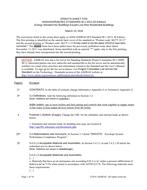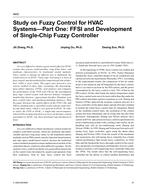This paper presents general guidance on designing for thermal comfort in combined chilled ceiling/displacement ventilation environments. Thermal comfort measurements involving 184 human subjects were carried out in a laboratory-based test room, constructed to resemble a normal office and equipped with a combined chilled ceiling and wall-mounted displacement ventilation system. Room characterization tests revealed that the chilled ceiling has a detrimental effect upon displacement flow, suppressing the stratified boundary layer at ceiling temperatures of 18°C – 21°C and destroying displacement flow all together at low ceiling temperatures (14°C – 16°C). Reduction in ceiling temperature was found to increase local air velocities at heights of 0.1 m and 1.1 m above the floor, showing further evidence of mixing, though there was an insignificant effect on local discomfort due to draft, as measured by subjective responses and by draft rating assessment. ISO Standard 7730 (1995) is shown to be valid, without modification, for predicting the thermal comfort of sedentary occupants performing office work in combined chilled ceiling/displacement ventilation environments. The vertical radiant asymmetry induced by a cooled ceiling does not significantly affect the thermal comfort of desk-seated occupants; this, together with relative humidity, is shown to require no additional comfort-related design limitations beyond those already in the literature and beyond the prevention of ceiling surface condensation.
Units: SI
Citation: Symposium, ASHRAE Transactions, 1998, Vol 104, pt. 1A, San Francisco
Product Details
- Published:
- 1998
- Number of Pages:
- 11
- File Size:
- 1 file , 190 KB
- Product Code(s):
- D-7850


